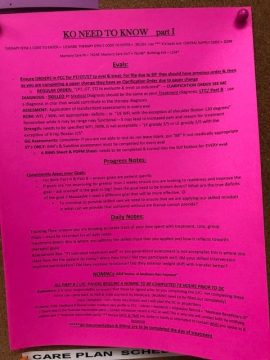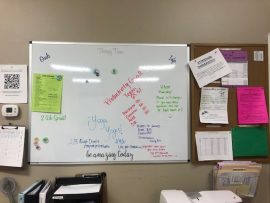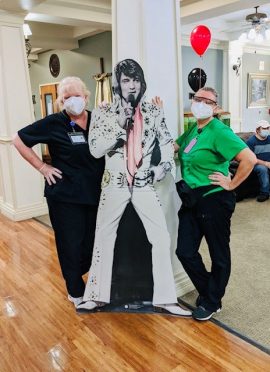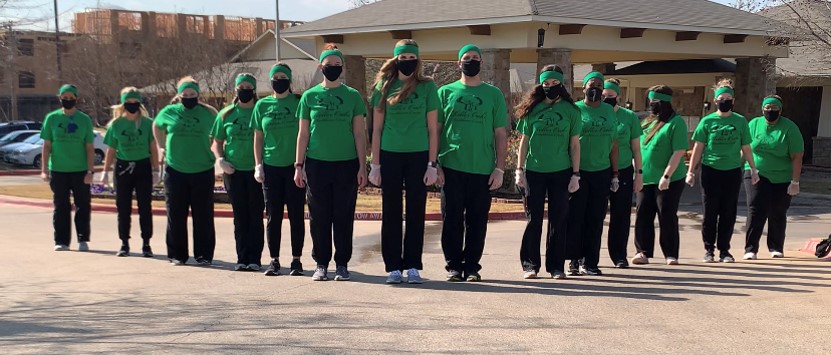Submitted by Jon Anderson, DPT, Therapy Resource
“KO Let’s Go, Let’s Go KO!” This is the rally cry at Keller Oaks in Keller, Texas, and it is a commonly heard anthem when you visit the facility. In a year that has been difficult at best in healthcare, the culture has done nothing but improve at Keller Oaks. When you look deeper to see what is in the air at Keller Oaks, it goes far beyond COVID.
 Kristin Ryther, the therapy program manager at Keller, has been a breath of fresh air in a very trying year at a facility that has been hit hard by COVID on multiple occasions. We asked her to share a bit of her best practices and were blown away by what is developing there.
Kristin Ryther, the therapy program manager at Keller, has been a breath of fresh air in a very trying year at a facility that has been hit hard by COVID on multiple occasions. We asked her to share a bit of her best practices and were blown away by what is developing there.
Starting with onboarding, Keller embraces culture by conducting group interviews and hiring only those people who the team agrees can be grown into great leaders. They agree on all hires and then make sure that the process does not stop there. According to Kristin, “Love is in the details.” She ensures that the new employee is greeted with everything that they need to be successful. She has their log-ins ready, an itinerary for their first day, and a team member assigned to them as a mentor. Kristin provides them with a bit of “swag” and has a ready-made reference form entitled “KO NEED TO KNOW” that includes everything from door codes to restroom locations to documentation tips and PCC locations of interest.
Culture at KO does not stop at onboarding. The team meetings incorporate music and moments of gratitude. Kristin has become a champion of championing others. She works to identify strengths in each of her team members and then assigns responsibilities appropriately. Each member has a strength; slow down and find it! It may be that they have special attention to individual treatments; they may be strong at scheduling, growing programs, or even leading the infection control of the gym. List them out and recognize them.
gratitude. Kristin has become a champion of championing others. She works to identify strengths in each of her team members and then assigns responsibilities appropriately. Each member has a strength; slow down and find it! It may be that they have special attention to individual treatments; they may be strong at scheduling, growing programs, or even leading the infection control of the gym. List them out and recognize them.
Ensure that you are communicating everything to your team. Utilize dry erase boards, address at team meetings, keep up-to-date information in binders. Use all means necessary to ensure that your team members have the communication they need to do their best work! Don’t forget to prioritize individual communication. Get to know your therapists and be transparent as well as approachable. Don’t be afraid to just listen and allow them to be heard.
 Set clear goals and expectations. Kristin sets goals for “2 week sprints.” Some programs are short projects. She assigns a leader and assists with facilitation but allows for teamwork so they meet their goals. She posts the sprints on the communication board, writes about it, takes pictures and then celebrates it. Short-term goals like this make it manageable, and then the challenge is less likely to be pushed off down the road.
Set clear goals and expectations. Kristin sets goals for “2 week sprints.” Some programs are short projects. She assigns a leader and assists with facilitation but allows for teamwork so they meet their goals. She posts the sprints on the communication board, writes about it, takes pictures and then celebrates it. Short-term goals like this make it manageable, and then the challenge is less likely to be pushed off down the road.
Celebrate the wins! Find the team member who loves to do this and assign it to them. Celebrate the day-to-day achievements and find 10 positives for every negative. Make sure the team feels appreciated and celebrated.
That is not to say that there will not be challenges. There will always be hurdles. When that happens, keep your positive vibes on! Start with yourself, and look in the mirror. Stay consistent. Be transparent. Don’t expect others to do something you wouldn’t do yourself. Hold them accountable after you have asked yourself, “Did I educate? Did I communicate? Did I reinforce?” Maintain accountability and expectations, but never be afraid to give each other grace. Most importantly, be yourself! Your team will recognize the authenticity and appreciate the transparency. Let them know it is okay to enjoy your work and have fun while you are doing it!

